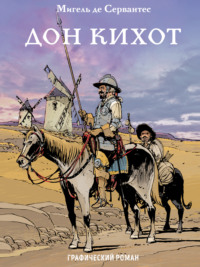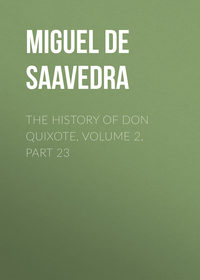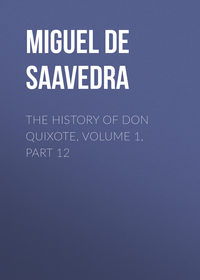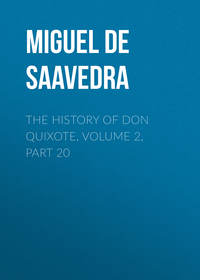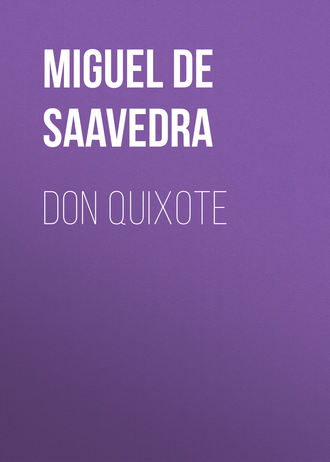 полная версия
полная версияDon Quixote
He shows plainly enough, too, that "Don Quixote" and the demolition of the chivalry romances was not the work that lay next his heart. He was, indeed, as he says himself in his preface, more a stepfather than a father to "Don Quixote." Never was great work so neglected by its author. That it was written carelessly, hastily, and by fits and starts, was not always his fault, but it seems clear he never read what he sent to the press. He knew how the printers had blundered, but he never took the trouble to correct them when the third edition was in progress, as a man who really cared for the child of his brain would have done. He appears to have regarded the book as little more than a mere libro de entretenimiento, an amusing book, a thing, as he says in the "Viaje," "to divert the melancholy moody heart at any time or season." No doubt he had an affection for his hero, and was very proud of Sancho Panza. It would have been strange indeed if he had not been proud of the most humorous creation in all fiction. He was proud, too, of the popularity and success of the book, and beyond measure delightful is the naivete with which he shows his pride in a dozen passages in the Second Part. But it was not the success he coveted. In all probability he would have given all the success of "Don Quixote," nay, would have seen every copy of "Don Quixote" burned in the Plaza Mayor, for one such success as Lope de Vega was enjoying on an average once a week.
And so he went on, dawdling over "Don Quixote," adding a chapter now and again, and putting it aside to turn to "Persiles and Sigismunda" – which, as we know, was to be the most entertaining book in the language, and the rival of "Theagenes and Chariclea" – or finishing off one of his darling comedies; and if Robles asked when "Don Quixote" would be ready, the answer no doubt was: En breve-shortly, there was time enough for that. At sixty-eight he was as full of life and hope and plans for the future as a boy of eighteen.
Nemesis was coming, however. He had got as far as Chapter LIX, which at his leisurely pace he could hardly have reached before October or November 1614, when there was put into his hand a small octave lately printed at Tarragona, and calling itself "Second Volume of the Ingenious Gentleman Don Quixote of La Mancha: by the Licentiate Alonso Fernandez de Avellaneda of Tordesillas." The last half of Chapter LIX and most of the following chapters of the Second Part give us some idea of the effect produced upon him, and his irritation was not likely to be lessened by the reflection that he had no one to blame but himself. Had Avellaneda, in fact, been content with merely bringing out a continuation to "Don Quixote," Cervantes would have had no reasonable grievance. His own intentions were expressed in the very vaguest language at the end of the book; nay, in his last words, "forse altro cantera con miglior plettro," he seems actually to invite some one else to continue the work, and he made no sign until eight years and a half had gone by; by which time Avellaneda's volume was no doubt written.
In fact Cervantes had no case, or a very bad one, as far as the mere continuation was concerned. But Avellaneda chose to write a preface to it, full of such coarse personal abuse as only an ill-conditioned man could pour out. He taunts Cervantes with being old, with having lost his hand, with having been in prison, with being poor, with being friendless, accuses him of envy of Lope's success, of petulance and querulousness, and so on; and it was in this that the sting lay. Avellaneda's reason for this personal attack is obvious enough. Whoever he may have been, it is clear that he was one of the dramatists of Lope's school, for he has the impudence to charge Cervantes with attacking him as well as Lope in his criticism on the drama. His identification has exercised the best critics and baffled all the ingenuity and research that has been brought to bear on it. Navarrete and Ticknor both incline to the belief that Cervantes knew who he was; but I must say I think the anger he shows suggests an invisible assailant; it is like the irritation of a man stung by a mosquito in the dark. Cervantes from certain solecisms of language pronounces him to be an Aragonese, and Pellicer, an Aragonese himself, supports this view and believes him, moreover, to have been an ecclesiastic, a Dominican probably.
Any merit Avellaneda has is reflected from Cervantes, and he is too dull to reflect much. "Dull and dirty" will always be, I imagine, the verdict of the vast majority of unprejudiced readers. He is, at best, a poor plagiarist; all he can do is to follow slavishly the lead given him by Cervantes; his only humour lies in making Don Quixote take inns for castles and fancy himself some legendary or historical personage, and Sancho mistake words, invert proverbs, and display his gluttony; all through he shows a proclivity to coarseness and dirt, and he has contrived to introduce two tales filthier than anything by the sixteenth century novellieri and without their sprightliness.
But whatever Avellaneda and his book may be, we must not forget the debt we owe them. But for them, there can be no doubt, "Don Quixote" would have come to us a mere torso instead of a complete work. Even if Cervantes had finished the volume he had in hand, most assuredly he would have left off with a promise of a Third Part, giving the further adventures of Don Quixote and humours of Sancho Panza as shepherds. It is plain that he had at one time an intention of dealing with the pastoral romances as he had dealt with the books of chivalry, and but for Avellaneda he would have tried to carry it out. But it is more likely that, with his plans, and projects, and hopefulness, the volume would have remained unfinished till his death, and that we should have never made the acquaintance of the Duke and Duchess, or gone with Sancho to Barataria.
From the moment the book came into his hands he seems to have been haunted by the fear that there might be more Avellanedas in the field, and putting everything else aside, he set himself to finish off his task and protect Don Quixote in the only way he could, by killing him. The conclusion is no doubt a hasty and in some places clumsy piece of work and the frequent repetition of the scolding administered to Avellaneda becomes in the end rather wearisome; but it is, at any rate, a conclusion and for that we must thank Avellaneda.
The new volume was ready for the press in February, but was not printed till the very end of 1615, and during the interval Cervantes put together the comedies and interludes he had written within the last few years, and, as he adds plaintively, found no demand for among the managers, and published them with a preface, worth the book it introduces tenfold, in which he gives an account of the early Spanish stage, and of his own attempts as a dramatist. It is needless to say they were put forward by Cervantes in all good faith and full confidence in their merits. The reader, however, was not to suppose they were his last word or final effort in the drama, for he had in hand a comedy called "Engano a los ojos," about which, if he mistook not, there would be no question.
Of this dramatic masterpiece the world has no opportunity of judging; his health had been failing for some time, and he died, apparently of dropsy, on the 23rd of April, 1616, the day on which England lost Shakespeare, nominally at least, for the English calendar had not yet been reformed. He died as he had lived, accepting his lot bravely and cheerfully.
Was it an unhappy life, that of Cervantes? His biographers all tell us that it was; but I must say I doubt it. It was a hard life, a life of poverty, of incessant struggle, of toil ill paid, of disappointment, but Cervantes carried within himself the antidote to all these evils. His was not one of those light natures that rise above adversity merely by virtue of their own buoyancy; it was in the fortitude of a high spirit that he was proof against it. It is impossible to conceive Cervantes giving way to despondency or prostrated by dejection. As for poverty, it was with him a thing to be laughed over, and the only sigh he ever allows to escape him is when he says, "Happy he to whom Heaven has given a piece of bread for which he is not bound to give thanks to any but Heaven itself." Add to all this his vital energy and mental activity, his restless invention and his sanguine temperament, and there will be reason enough to doubt whether his could have been a very unhappy life. He who could take Cervantes' distresses together with his apparatus for enduring them would not make so bad a bargain, perhaps, as far as happiness in life is concerned.
Of his burial-place nothing is known except that he was buried, in accordance with his will, in the neighbouring convent of Trinitarian nuns, of which it is supposed his daughter, Isabel de Saavedra, was an inmate, and that a few years afterwards the nuns removed to another convent, carrying their dead with them. But whether the remains of Cervantes were included in the removal or not no one knows, and the clue to their resting-place is now lost beyond all hope. This furnishes perhaps the least defensible of the items in the charge of neglect brought against his contemporaries. In some of the others there is a good deal of exaggeration. To listen to most of his biographers one would suppose that all Spain was in league not only against the man but against his memory, or at least that it was insensible to his merits, and left him to live in misery and die of want. To talk of his hard life and unworthy employments in Andalusia is absurd. What had he done to distinguish him from thousands of other struggling men earning a precarious livelihood? True, he was a gallant soldier, who had been wounded and had undergone captivity and suffering in his country's cause, but there were hundreds of others in the same case. He had written a mediocre specimen of an insipid class of romance, and some plays which manifestly did not comply with the primary condition of pleasing: were the playgoers to patronise plays that did not amuse them, because the author was to produce "Don Quixote" twenty years afterwards?
The scramble for copies which, as we have seen, followed immediately on the appearance of the book, does not look like general insensibility to its merits. No doubt it was received coldly by some, but if a man writes a book in ridicule of periwigs he must make his account with being coldly received by the periwig wearers and hated by the whole tribe of wigmakers. If Cervantes had the chivalry-romance readers, the sentimentalists, the dramatists, and the poets of the period all against him, it was because "Don Quixote" was what it was; and if the general public did not come forward to make him comfortable for the rest of his days, it is no more to be charged with neglect and ingratitude than the English-speaking public that did not pay off Scott's liabilities. It did the best it could; it read his book and liked it and bought it, and encouraged the bookseller to pay him well for others.
It has been also made a reproach to Spain that she has erected no monument to the man she is proudest of; no monument, that is to say, of him; for the bronze statue in the little garden of the Plaza de las Cortes, a fair work of art no doubt, and unexceptionable had it been set up to the local poet in the market-place of some provincial town, is not worthy of Cervantes or of Madrid. But what need has Cervantes of "such weak witness of his name;" or what could a monument do in his case except testify to the self-glorification of those who had put it up? Si monumentum quoeris, circumspice. The nearest bookseller's shop will show what bathos there would be in a monument to the author of "Don Quixote."
Nine editions of the First Part of "Don Quixote" had already appeared before Cervantes died, thirty thousand copies in all, according to his own estimate, and a tenth was printed at Barcelona the year after his death. So large a number naturally supplied the demand for some time, but by 1634 it appears to have been exhausted; and from that time down to the present day the stream of editions has continued to flow rapidly and regularly. The translations show still more clearly in what request the book has been from the very outset. In seven years from the completion of the work it had been translated into the four leading languages of Europe. Except the Bible, in fact, no book has been so widely diffused as "Don Quixote." The "Imitatio Christi" may have been translated into as many different languages, and perhaps "Robinson Crusoe" and the "Vicar of Wakefield" into nearly as many, but in multiplicity of translations and editions "Don Quixote" leaves them all far behind.
Still more remarkable is the character of this wide diffusion. "Don Quixote" has been thoroughly naturalised among people whose ideas about knight-errantry, if they had any at all, were of the vaguest, who had never seen or heard of a book of chivalry, who could not possibly feel the humour of the burlesque or sympathise with the author's purpose. Another curious fact is that this, the most cosmopolitan book in the world, is one of the most intensely national. "Manon Lescaut" is not more thoroughly French, "Tom Jones" not more English, "Rob Roy" not more Scotch, than "Don Quixote" is Spanish, in character, in ideas, in sentiment, in local colour, in everything. What, then, is the secret of this unparalleled popularity, increasing year by year for well-nigh three centuries? One explanation, no doubt, is that of all the books in the world, "Don Quixote" is the most catholic. There is something in it for every sort of reader, young or old, sage or simple, high or low. As Cervantes himself says with a touch of pride, "It is thumbed and read and got by heart by people of all sorts; the children turn its leaves, the young people read it, the grown men understand it, the old folk praise it."
But it would be idle to deny that the ingredient which, more than its humour, or its wisdom, or the fertility of invention or knowledge of human nature it displays, has insured its success with the multitude, is the vein of farce that runs through it. It was the attack upon the sheep, the battle with the wine-skins, Mambrino's helmet, the balsam of Fierabras, Don Quixote knocked over by the sails of the windmill, Sancho tossed in the blanket, the mishaps and misadventures of master and man, that were originally the great attraction, and perhaps are so still to some extent with the majority of readers. It is plain that "Don Quixote" was generally regarded at first, and indeed in Spain for a long time, as little more than a queer droll book, full of laughable incidents and absurd situations, very amusing, but not entitled to much consideration or care. All the editions printed in Spain from 1637 to 1771, when the famous printer Ibarra took it up, were mere trade editions, badly and carelessly printed on vile paper and got up in the style of chap-books intended only for popular use, with, in most instances, uncouth illustrations and clap-trap additions by the publisher.
To England belongs the credit of having been the first country to recognise the right of "Don Quixote" to better treatment than this. The London edition of 1738, commonly called Lord Carteret's from having been suggested by him, was not a mere edition de luxe. It produced "Don Quixote" in becoming form as regards paper and type, and embellished with plates which, if not particularly happy as illustrations, were at least well intentioned and well executed, but it also aimed at correctness of text, a matter to which nobody except the editors of the Valencia and Brussels editions had given even a passing thought; and for a first attempt it was fairly successful, for though some of its emendations are inadmissible, a good many of them have been adopted by all subsequent editors.
The zeal of publishers, editors, and annotators brought about a remarkable change of sentiment with regard to "Don Quixote." A vast number of its admirers began to grow ashamed of laughing over it. It became almost a crime to treat it as a humorous book. The humour was not entirely denied, but, according to the new view, it was rated as an altogether secondary quality, a mere accessory, nothing more than the stalking-horse under the presentation of which Cervantes shot his philosophy or his satire, or whatever it was he meant to shoot; for on this point opinions varied. All were agreed, however, that the object he aimed at was not the books of chivalry. He said emphatically in the preface to the First Part and in the last sentence of the Second, that he had no other object in view than to discredit these books, and this, to advanced criticism, made it clear that his object must have been something else.
One theory was that the book was a kind of allegory, setting forth the eternal struggle between the ideal and the real, between the spirit of poetry and the spirit of prose; and perhaps German philosophy never evolved a more ungainly or unlikely camel out of the depths of its inner consciousness. Something of the antagonism, no doubt, is to be found in "Don Quixote," because it is to be found everywhere in life, and Cervantes drew from life. It is difficult to imagine a community in which the never-ceasing game of cross-purposes between Sancho Panza and Don Quixote would not be recognized as true to nature. In the stone age, among the lake dwellers, among the cave men, there were Don Quixotes and Sancho Panzas; there must have been the troglodyte who never could see the facts before his eyes, and the troglodyte who could see nothing else. But to suppose Cervantes deliberately setting himself to expound any such idea in two stout quarto volumes is to suppose something not only very unlike the age in which he lived, but altogether unlike Cervantes himself, who would have been the first to laugh at an attempt of the sort made by anyone else.
The extraordinary influence of the romances of chivalry in his day is quite enough to account for the genesis of the book. Some idea of the prodigious development of this branch of literature in the sixteenth century may be obtained from the scrutiny of Chapter VII, if the reader bears in mind that only a portion of the romances belonging to by far the largest group are enumerated. As to its effect upon the nation, there is abundant evidence. From the time when the Amadises and Palmerins began to grow popular down to the very end of the century, there is a steady stream of invective, from men whose character and position lend weight to their words, against the romances of chivalry and the infatuation of their readers. Ridicule was the only besom to sweep away that dust.
That this was the task Cervantes set himself, and that he had ample provocation to urge him to it, will be sufficiently clear to those who look into the evidence; as it will be also that it was not chivalry itself that he attacked and swept away. Of all the absurdities that, thanks to poetry, will be repeated to the end of time, there is no greater one than saying that "Cervantes smiled Spain's chivalry away." In the first place there was no chivalry for him to smile away. Spain's chivalry had been dead for more than a century. Its work was done when Granada fell, and as chivalry was essentially republican in its nature, it could not live under the rule that Ferdinand substituted for the free institutions of mediaeval Spain. What he did smile away was not chivalry but a degrading mockery of it.
The true nature of the "right arm" and the "bright array," before which, according to the poet, "the world gave ground," and which Cervantes' single laugh demolished, may be gathered from the words of one of his own countrymen, Don Felix Pacheco, as reported by Captain George Carleton, in his "Military Memoirs from 1672 to 1713." "Before the appearance in the world of that labour of Cervantes," he said, "it was next to an impossibility for a man to walk the streets with any delight or without danger. There were seen so many cavaliers prancing and curvetting before the windows of their mistresses, that a stranger would have imagined the whole nation to have been nothing less than a race of knight-errants. But after the world became a little acquainted with that notable history, the man that was seen in that once celebrated drapery was pointed at as a Don Quixote, and found himself the jest of high and low. And I verily believe that to this, and this only, we owe that dampness and poverty of spirit which has run through all our councils for a century past, so little agreeable to those nobler actions of our famous ancestors."
To call "Don Quixote" a sad book, preaching a pessimist view of life, argues a total misconception of its drift. It would be so if its moral were that, in this world, true enthusiasm naturally leads to ridicule and discomfiture. But it preaches nothing of the sort; its moral, so far as it can be said to have one, is that the spurious enthusiasm that is born of vanity and self-conceit, that is made an end in itself, not a means to an end, that acts on mere impulse, regardless of circumstances and consequences, is mischievous to its owner, and a very considerable nuisance to the community at large. To those who cannot distinguish between the one kind and the other, no doubt "Don Quixote" is a sad book; no doubt to some minds it is very sad that a man who had just uttered so beautiful a sentiment as that "it is a hard case to make slaves of those whom God and Nature made free," should be ungratefully pelted by the scoundrels his crazy philanthropy had let loose on society; but to others of a more judicial cast it will be a matter of regret that reckless self-sufficient enthusiasm is not oftener requited in some such way for all the mischief it does in the world.
A very slight examination of the structure of "Don Quixote" will suffice to show that Cervantes had no deep design or elaborate plan in his mind when he began the book. When he wrote those lines in which "with a few strokes of a great master he sets before us the pauper gentleman," he had no idea of the goal to which his imagination was leading him. There can be little doubt that all he contemplated was a short tale to range with those he had already written, a tale setting forth the ludicrous results that might be expected to follow the attempt of a crazy gentleman to act the part of a knight-errant in modern life.
It is plain, for one thing, that Sancho Panza did not enter into the original scheme, for had Cervantes thought of him he certainly would not have omitted him in his hero's outfit, which he obviously meant to be complete. Him we owe to the landlord's chance remark in Chapter III that knights seldom travelled without squires. To try to think of a Don Quixote without Sancho Panza is like trying to think of a one-bladed pair of scissors.
The story was written at first, like the others, without any division and without the intervention of Cide Hamete Benengeli; and it seems not unlikely that Cervantes had some intention of bringing Dulcinea, or Aldonza Lorenzo, on the scene in person. It was probably the ransacking of the Don's library and the discussion on the books of chivalry that first suggested it to him that his idea was capable of development. What, if instead of a mere string of farcical misadventures, he were to make his tale a burlesque of one of these books, caricaturing their style, incidents, and spirit?
In pursuance of this change of plan, he hastily and somewhat clumsily divided what he had written into chapters on the model of "Amadis," invented the fable of a mysterious Arabic manuscript, and set up Cide Hamete Benengeli in imitation of the almost invariable practice of the chivalry-romance authors, who were fond of tracing their books to some recondite source. In working out the new ideas, he soon found the value of Sancho Panza. Indeed, the keynote, not only to Sancho's part, but to the whole book, is struck in the first words Sancho utters when he announces his intention of taking his ass with him. "About the ass," we are told, "Don Quixote hesitated a little, trying whether he could call to mind any knight-errant taking with him an esquire mounted on ass-back; but no instance occurred to his memory." We can see the whole scene at a glance, the stolid unconsciousness of Sancho and the perplexity of his master, upon whose perception the incongruity has just forced itself. This is Sancho's mission throughout the book; he is an unconscious Mephistopheles, always unwittingly making mockery of his master's aspirations, always exposing the fallacy of his ideas by some unintentional ad absurdum, always bringing him back to the world of fact and commonplace by force of sheer stolidity.


